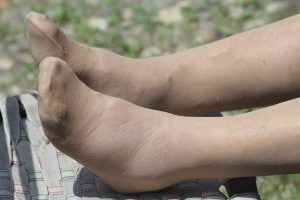
Diagnosing swollen feet and legs
There are many reasons why a person’s feet and legs would swell up. Uncovering that reason, with the help of your doctor, can lead to a better treatment. If you experience swollen feet and legs often, and you begin to notice sores and redness, see your doctor to get down to the underlying cause.
When you visit your doctor they’ll begin to ask you a series of questions. The questions might not seem to relate to your swollen feet and legs, but they are important.
Questions your doctor might ask include:
- How are you sleeping?
- What is your diet like?
- What medications are you taking?
- What time of day does the swelling occur?
- How long does the swelling last?
- When does the swelling subside?
- Are you in pain?
They might check your hormones and they will discuss your activity level with you. By asking these questions doctors can narrow down reasons for swollen feet and legs.
Causes for swollen feet and legs
There are many reasons for swollen feet and legs. Some of these reasons are:
- Injury – sprain or fracture
- Congestive heart failure
- Kidney failure
- Obesity
- Osteoarthritis
- Cirrhosis – disease of the liver
- Hypertensive heart disease
- Nutritional deficiencies
- Hypothyroidism
- Peripheral vascular disease
- Deep vein thrombosis – blood clot
- Chronic bronchitis.
These are just some of the possible causes for swollen feet and legs. The list goes on. As a symptom spanning many conditions, seeking medical attention for swollen feet and legs is important.
Treatment of swollen feet and legs
Typically, treatment of swollen feet and legs might begin with compression socks and water pills. Compression socks help move fluid back into the capillaries, thus reducing swelling.
If swelling is due to an injury, treat the area with ice and bandages or a cast.
Even if swelling in your legs and feet hasn’t affected your day-to-day lifestyle, you should check with your doctor. It could be an early sign for a preventable illness.
Natural remedies for swollen feet and swollen legs
If you’re looking for natural remedies for swollen feet and swollen legs, look no further than these helpful and effective tips to reduce swelling:
- Check your magnesium levels as a deficiency in magnesium can lead to swollen feet and ankles. If you do have a deficiency, take a magnesium supplement to boost up your levels.
- Try yoga or other forms of exercise as it can help boost circulation.
- Soak in tonic water as it can help reduce swelling.
- Take a bath with grapefruit essential oil, or if you don’t want to take a bath you can give yourself a massage with grapefruit essential oil mixed with olive oil.
- Soak in salt water.
- Get regular massages by a massage therapist.
- Wear supportive hosiery like compression socks.
- Keep your feet and legs elevated when you are at rest to avoid blood pooling.
- Go swimming as it can alleviate pressure on your legs and feet.
- Drink plenty of water as you may be retaining salt.
If these tips don’t offer you relief from your swollen feet or legs, speak to your doctor about underlying conditions, which may need to be treated to reduce swelling.
Related Reading:
Natural remedies for smelly feet
Most of us have known someone who has smelly feet, or perhaps you have cleared out a room with your own stinky tootsies. Your hoofs, piggies, or whatever you like to call them, get a real workout. You stand with them, walk and run, so they are bound to get sweaty and in some cases stinky. Up to 15 percent of the population has really bad foot odor. Continue reading…
Take a closer look at your feet for health warning signs
You walk on them, you squeeze them into shoes, and they can develop blisters, bunions, and calluses, but our feet also can offer us so much more insight into our overall health than just helping us get out and about. Continue reading…
Source:
http://www.care2.com/greenliving/10-natural-remedies-for-swollen-feet-and-ankles.html
Related: 5 causes for swollen feet